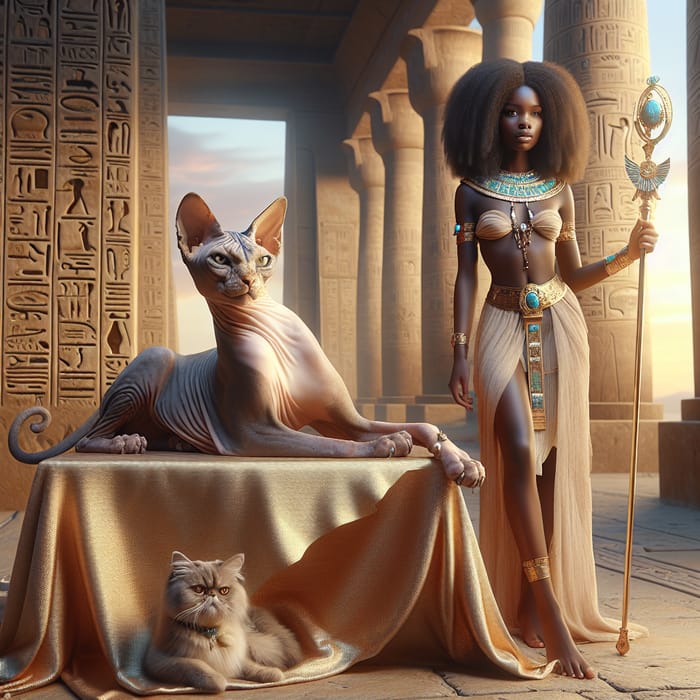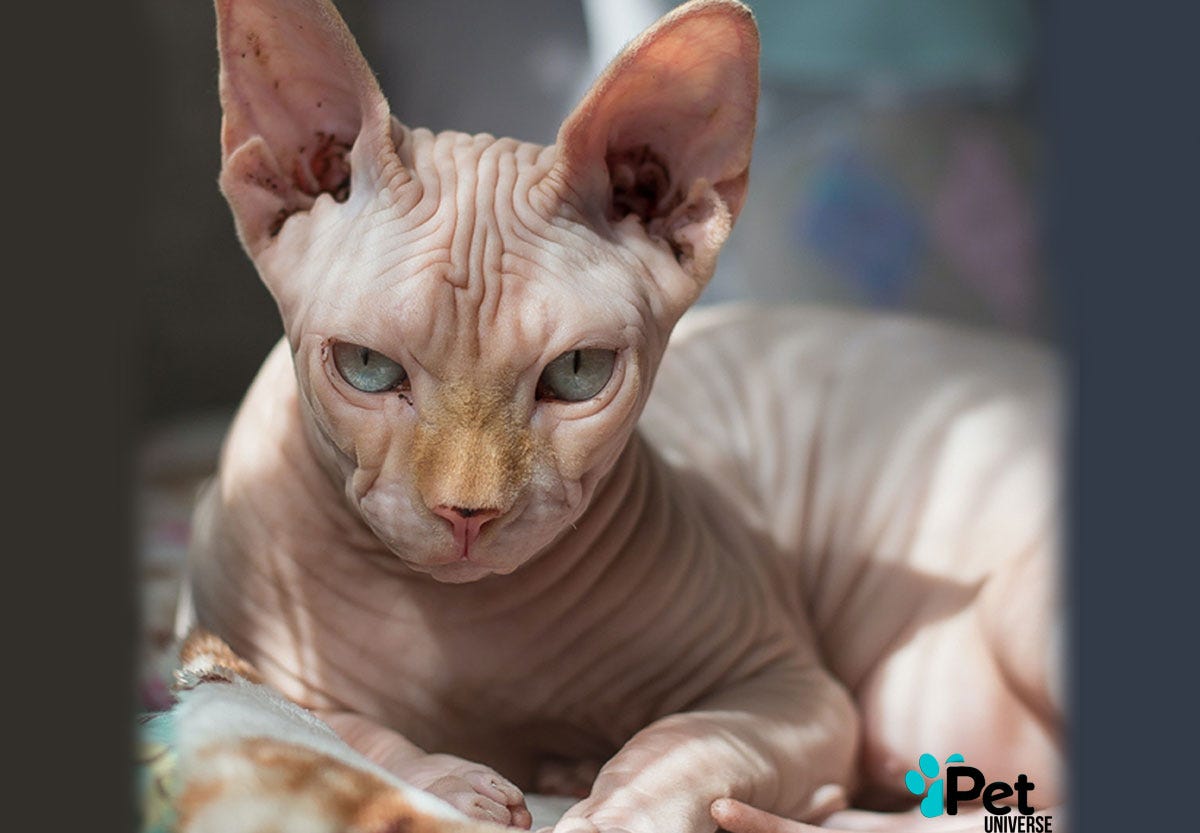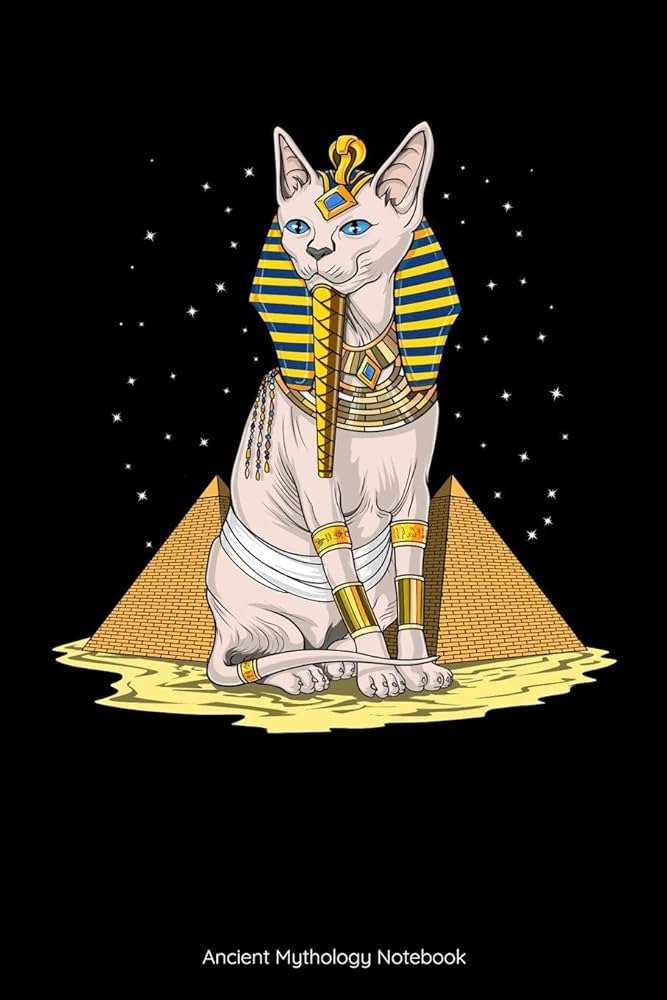The Sphynx cats of ancient Egypt were not actually hairless but had short, fine fur. They were considered a sacred breed and were often depicted in sculptures and paintings, symbolizing royalty and sacred status.
The Egyptians believed that the sphinx was a representation of their solar deity, Sun God, Horemakhet or Horus of the Horizon. Tracing back to the New Kingdom, the sphinx held great significance in Egyptian culture. It is theorized that the Great Sphinx of Giza may have originally been a lion-shaped natural landform modified by ancient Egyptians to resemble a stone-faced feline.
The Sphynx cat, also known as the Canadian Sphynx, is a breed known for its lack of fur and is a relatively modern development compared to the cats of ancient Egypt.

Credit: en.wikipedia.org
Table of Contents
ToggleThe Enigmatic Sphynx
Sphynx cats, with their distinctive hairless appearance and captivating eyes, have long been associated with mystery and intrigue. Originating from Egypt, these enigmatic felines have a rich history intertwined with myths and misconceptions.
Origins And History
The Sphynx cat’s origins can be traced back to the land of the pharaohs, Egypt. Contrary to popular belief, these cats were not originally hairless; they had short, fine fur. Revered by the ancient Egyptians, Sphynx cats were considered a sacred breed and were often depicted in sculptures and paintings. They were believed to possess mystical qualities and were associated with the goddess Bastet, the ancient Egyptian deity of home, fertility, and domesticity.
Myths And Misconceptions
One of the prevailing myths surrounding the Sphynx cat is that they were worshipped by the ancient Egyptians. While they were indeed revered, they were not worshipped in the same way as deities. Another misconception is that the Great Sphinx of Giza may have originally been a representation of a Sphynx cat, whereas in reality, it was likely a lion-shaped natural landform that was later modified by ancient Egyptians.

Credit: easy-peasy.ai
Sacred Cats Of Ancient Egypt
The Sphynx cat, often associated with Ancient Egypt, was not actually hairless but had fine fur. They were considered a sacred breed and depicted in sculptures and paintings, believed to possess mystical qualities and associated with the goddess Bastet.
Sacred Cats of Ancient Egypt Sphynx cats may be known for their hairlessness, but their roots can be traced back to Ancient Egypt where they were considered sacred. These cats were not only kept as pets, but they were also worshipped and revered as symbols of the divine. Symbolism and Significance In Egyptian mythology, the goddess Bastet was often depicted as a woman with the head of a cat. This association led to the belief that cats were divine creatures, and the Egyptians treated them accordingly.
Sphynx cats were especially prized for their unique appearance and believed to possess mystical qualities. The Feline and the Divine The Egyptians believed that the sphinx was a representation of their solar deity, Sun God, Horemakhet or Horus of the Horizon. Historical records from the New Kingdom show that in Egyptian culture, the sphinx symbolized royalty and sacred status.
This association with divinity extended to the Sphynx cat breed, which was considered a sacred animal and worshipped in temples. Sphynx cats were often depicted in sculptures and paintings, and their likeness can be seen in the famous statue of the Great Sphinx of Giza. This statue, which has the head of a human and the body of a lion, is believed to represent the pharaoh Khafre and symbolizes the union between the divine and human.
In Conclusion The Sphynx cat’s roots can be traced back to Ancient Egypt, where they were considered sacred creatures and worshipped as symbols of the divine. Their unique appearance and mystical qualities made them highly prized, and their association with divinity can be seen in the famous statue of the Great Sphinx of Giza. Even today, the Sphynx cat remains a fascinating and beloved breed, with a rich and storied history.
The Truth Behind Hairlessness
When it comes to the enigmatic Sphynx cat, its hairless appearance is often a subject of fascination and curiosity. However, the truth behind this unique feature lies in genetic mutation and modern breeding practices.
Genetic Mutation
The hairlessness of the Sphynx cat is a result of a genetic mutation that affects the cat’s hair follicles. This mutation leads to the absence of a coat, giving the Sphynx its distinctive appearance. While the Sphynx may appear completely hairless, they actually have a fine layer of downy fur that gives them a soft and warm feel to the touch.
Modern Breeding
Modern breeding practices have played a significant role in the development and preservation of the Sphynx cat breed. Breeders carefully select and pair cats with the hairless gene to maintain the unique characteristic of the breed. Through selective breeding, the Sphynx cat has become a beloved and recognizable feline with its striking appearance and affectionate nature.

Credit: medium.com
Caring For A Sphynx
Caring for a Sphynx Cat Egypt, believed to have roots in ancient Egypt, requires special attention due to their hairless nature. Regular bathing to remove excess oil and dirt is essential, along with providing warmth and protection from sunburn. Additionally, Sphynx cats need a balanced diet to maintain their unique physique and skin health.
Skin Care Essentials
Sphynx cats are known for their unique hairless appearance, which requires special attention to their skin care. Due to their lack of fur, their skin is more exposed and prone to dryness and sunburn. To keep their skin healthy and moisturized, it’s important to establish a regular skin care routine.
Diet And Nutrition
A well-balanced diet is crucial for the overall health and well-being of your Sphynx cat. Since they have a higher metabolic rate compared to other cats, they require a nutrient-rich diet to meet their energy needs. It’s recommended to feed them high-quality cat food that is specifically formulated for hairless breeds.
Grooming And Hygiene
Although Sphynx cats don’t have fur, they still require regular grooming and hygiene practices. Their skin produces natural oils that need to be distributed evenly, so gentle bathing is necessary to remove excess oils and dirt. It’s important to use a mild, hypoallergenic shampoo and to dry their skin thoroughly after bathing to prevent any skin irritations.
Environmental Considerations
Due to their lack of fur, Sphynx cats are more sensitive to temperature changes. It’s essential to provide them with a warm and comfortable environment, especially during colder months. Make sure they have access to cozy beds, blankets, and heated areas to keep them comfortable and prevent them from getting too cold.
Veterinary Care
Regular veterinary check-ups are crucial for the health of your Sphynx cat. They may be more prone to certain health issues such as skin infections and heart conditions. It’s important to schedule routine vaccinations, dental cleanings, and overall wellness examinations to ensure their well-being.
Caring for a Sphynx cat requires specific attention to their unique needs. By following a proper skin care routine, providing a balanced diet, maintaining good hygiene, creating a suitable environment, and seeking regular veterinary care, you can ensure that your Sphynx cat remains happy and healthy.
The Sphinx And Sphynx: A Comparison
The Sphynx cat and the Sphinx of Egypt may share a name, but they are quite different. While the Sphinx is a famous statue in Egypt, the Sphynx cat actually originated in Canada and is known for its hairlessness. Despite their name, Sphynx cats were not present in ancient Egypt.
Architectural Marvel Vs. Feline Breed
When one thinks of the Sphinx, the first image that comes to mind is the colossal statue in Egypt. The Great Sphinx of Giza is a marvel of ancient architecture, steeped in mystery and legend. On the other hand, the Sphynx cat is a unique feline breed known for its hairlessness. Despite their vastly different appearances, both the Sphinx and Sphynx have captured the human imagination and hold a special place in history.
Cultural Depictions
The Great Sphinx of Giza has been immortalized in countless works of art, literature, and film. It is often depicted as a symbol of power, mystery, and wisdom. In ancient Egypt, it was believed to be a guardian of the pharaohs and a protector of sacred knowledge. Similarly, the Sphynx cat has also been depicted in art and popular culture. Due to its unique appearance, it has been associated with qualities such as intelligence, curiosity, and affection.
In ancient Egypt, the Sphynx cat was considered a sacred breed and was often depicted in sculptures and paintings. They were believed to possess mystical qualities and were associated with the goddess Bastet, the ancient Egyptian deity of home, fertility, and childbirth. The Egyptians held a strong belief in the afterlife and often included Sphynx cats in burials as a symbol of protection and guidance.
In conclusion, despite their differences, the Sphinx and Sphynx both hold a special place in human culture and history. Whether it is through the grandeur of ancient architecture or the unique appearance of a feline breed, these iconic symbols continue to fascinate and intrigue us to this day.
Misnamed Or Mystique?
The Sphynx cats of ancient Egypt were not actually hairless, but had short, fine fur. They were considered a sacred breed and often depicted in sculptures and paintings due to their association with the goddess Bastet. The Great Sphinx of Giza, although not a representation of an Egyptian cat, is one of the oldest known monumental sculptures in Egypt.
The Sphynx Name Debate
The Sphynx cat breed is often associated with ancient Egypt due to its unique appearance and name. However, the truth behind the breed’s origins and name is still a topic of debate among experts and cat enthusiasts alike.
Contemporary Confusions
Despite their name, Sphynx cats of ancient Egypt were not actually hairless. They had short, fine fur and were considered a sacred breed. However, it wasn’t until the 1960s that the first hairless Sphynx cat was born in Toronto, Canada. This new breed quickly gained popularity and was eventually named the Sphynx cat after the Great Sphinx of Giza in Egypt.
While the Sphynx cat breed is often associated with ancient Egypt, there is still debate over whether or not they are truly a representation of the ancient Egyptian cat. Some argue that the breed’s unique appearance and association with the Great Sphinx of Giza are enough to justify the name, while others believe that the breed’s lack of true hairlessness and genetic origins in Canada make the name inappropriate. Despite the ongoing debate, one thing is certain: Sphynx cats are a fascinating and beloved breed that continue to capture the hearts of cat lovers around the world.
Sphynx Cats In Pop Culture
Sphynx Cats in Pop Culture have gained attention due to their association with ancient Egypt. Despite their name, the cats of ancient Egypt were not actually hairless but had short, fine fur. They were considered a sacred breed and often depicted in sculptures and paintings, symbolizing royalty and sacred status.
From Ancient Art To Modern Media
The Sphynx cat, often associated with ancient Egypt, has made a lasting impact on pop culture. From ancient art to modern media, these unique felines have captivated the imagination of people around the world. In ancient Egypt, Sphynx cats were not actually hairless but had short, fine fur. Despite their name, they were considered a sacred breed and were often depicted in sculptures and paintings.
These representations showcased their regal and mystical qualities, as they were associated with the goddess Bastet, the deity of home, fertility, and protection. The fascination with Sphynx cats in ancient Egypt continues to influence modern media. The iconic appearance of these hairless cats has been featured in various forms of entertainment, including movies, television shows, and literature. Their distinct look and enigmatic allure make them a popular choice for artistic expression.
Iconic Appearances
Sphynx cats have made their mark in the world of pop culture through their iconic appearances. Whether it’s in movies, such as the James Bond film “Diamonds Are Forever,” or in literature, like the famous feline character Mr. Bigglesworth from the “Austin Powers” series, these cats have become recognizable symbols in popular media. Their unique physical features, including their hairless bodies and large ears, make them instantly recognizable and visually striking.
This has led to their inclusion in various forms of media, from advertisements to music videos. Sphynx cats have become a symbol of individuality and intrigue, representing a sense of mystery and elegance. In conclusion, Sphynx cats have left a lasting impact on pop culture. From their portrayal in ancient Egyptian art to their appearances in modern media, these hairless felines have become iconic symbols of beauty, mystique, and individuality.
Adopting A Sphynx Cat
Are you considering adding a Sphynx cat to your family? These unique and charming felines have captured the hearts of many cat enthusiasts with their distinctive appearance and playful personalities.
Originating from Egypt, Sphynx cats were once revered as sacred animals. Despite their name, they are not entirely hairless; they have a fine layer of downy fur. If you’re drawn to their hairless look and want a companion that stands out from the crowd, a Sphynx cat might be the perfect choice for you.
Adopting a Sphynx cat comes with a set of responsibilities. Ensuring that your new feline friend is happy and healthy requires dedication and care.
- Regular grooming: Despite their lack of fur, Sphynx cats need regular bathing to remove excess oil and dirt from their skin.
- Environmental considerations: Due to their lack of insulation, Sphynx cats are sensitive to temperature changes. Provide a warm and cozy environment to keep them comfortable.
- Healthcare: Regular veterinary check-ups and a nutritious diet are essential for their well-being.
By embracing the responsibility of owning a Sphynx cat, you can enjoy a fulfilling and unique companionship with these extraordinary felines.
Frequently Asked Questions
Did Sphynx Cats Exist In Egypt?
Sphynx cats did not exist in ancient Egypt. Despite their name, the sphynx cats of ancient Egypt had short, fine fur and were considered a sacred breed. They were often depicted in sculptures and paintings.
Why Do Egyptians Worship Sphynx?
The Egyptians worshiped the Sphinx because they believed it represented their solar deity, the Sun God Horemakhet or Horus of the Horizon. It symbolized royalty and sacred status in Egyptian culture. The Sphinx was associated with the goddess Bastet and was considered to possess mystical qualities.
Despite their name, the sphinx cats of ancient Egypt had short, fine fur and were considered a sacred breed.
Is The Sphinx An Egyptian Cat?
The Sphinx is not an Egyptian cat. It is a monumental statue with the body of a lion and the head of a human.
What Cat Breed Did Egyptians Worship?
The Egyptians worshiped the Abyssinian cat breed, which is believed to closely resemble the sacred cats of ancient Egypt.
Conclusion
In ancient Egypt, the Sphynx cat was highly revered and considered a sacred breed. Despite their name, these cats were not actually hairless but had short, fine fur. Depicted in sculptures and paintings, they symbolized royalty and held a sacred status.
The connection between the Sphynx cat and Egyptian culture is fascinating, showcasing the deep admiration and worship of these feline creatures. Exploring the rich history of the Sphynx cat in Egypt reveals their mystical qualities and their association with the goddess Bastet, the deity of home and fertility.

